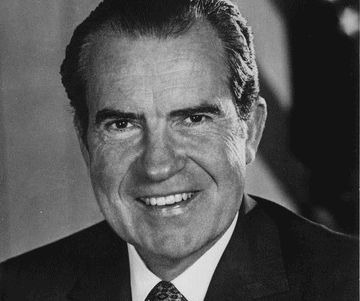<![CDATA[The 8th August marked the anniversary of one of the most pivotal days in modern US history. The resignation of Richard Nixon in response to the Watergate scandal was both symptom and cause of the changing face of politics. The event can be seen as a key step in the formation of the behaviour that is required of political parties, and the attitudes citizens have towards them in the US, and elsewhere. No president had resigned from office before Nixon, which goes someway to explain just how startling the events forty years ago were. The resignation was a direct response to the Watergate Scandal, a complex web of intrigue and espionage that laid bare the ugly side of politics. The event is so infamous that the suffix ‘gate’ is now attached to any scandal big or small. The scandal and resignation came to define Nixon’s career. Watergate refers to events at the Watergate Hotel Complex in Washington D.C. in 1972. A group of five burglars broke into the Democratic Offices in the complex, and were caught by security guard Frank Wills. The five men, led by Howard Hunt, and G. Gordon Liddy, were arrested, and on interrogation admitted to an earlier break-in to the same offices. What the burglars were searching for has never been clearly ascertained, as the perpetrators have always supplied conflicting testimonies. Some possibilities include evidence that the Democratic Party was receiving funding from the Cuban government, or evidence the Democrats themselves had that Nixon received funding from Howard Hughes and Larry O’Brien. What is clear is that the investigation of the incident revealed many layers of intrigue, corruption and deception. The burglars were quickly traced back to the Republican ‘Committee For the Re-Election Of the President’. To make a bad situation worse, Nixon denied any wrong doing, resisted investigation and ultimately attempted a cover up. The investigations, pushed for by the media, eventually uncovered that the Republicans had bugged opponent’s offices, harassed activists and political figures, and used the FBI, CIA and Inland Revenue Service for political gain. Nixon’s career represents a changing era in politics. He had been Vice President during the Eisenhower administration and first ran for president in 1960. His eventual loss revealed the rising importance of the media in a successful presidency run. In 1950 11% of American households had a TV set, but by 1960 this had risen to 88%. Despite similar popularity ratings, Nixon lost out heavily in televised debates to his young and dynamic Democratic counterpart, John F. Kennedy. He eventually won the 1968 election, in large part due to his promise to end American involvement in the Vietnam War. Something he eventually achieved during his presidency. The Watergate Scandal, the event that in many ways overshadows his whole career, again revealed an ignorance of the nature of modern politics. No doubt such underhand espionage tactics existed before Nixon, and have probably carried on since. What hurt Nixon so much was not only getting caught, but failing to deal with the media frenzy it generated, which led to more revelations. Once the burglary was uncovered, the media delved deeper and deeper, and congress had to investigate further. Ultimately Nixon resigned to avoid impeachment, aware that both his involvement and the fact he had lied about it were on the verge of being revealed. Nixon’s administration was so tarnished because every detail was played out in the media- alongside all the controversies, there was also a cataclysmic PR failure. Nixon’s resignation symbolised the end of an era. Politicians were now very much embroiled in the age of information and had to consider their every move. Any misdemeanour would be played out and debated in front of millions of people. The costs of getting caught were much higher, and the importance of good press relations emphasised. The failures of Nixon’s career provide important lessons that have been adopted by the majority of politicians since.]]>
Nixon’s Resignation Forty Years On
